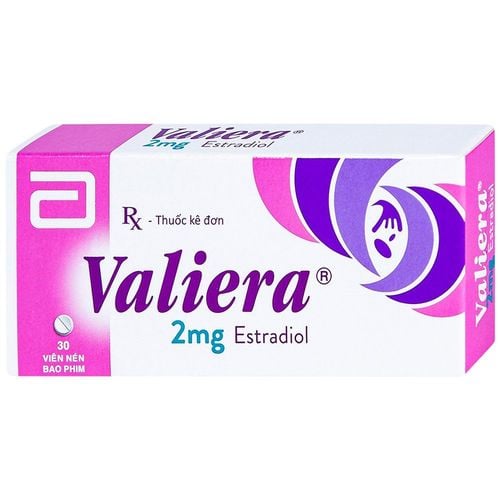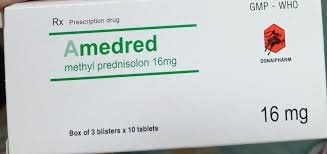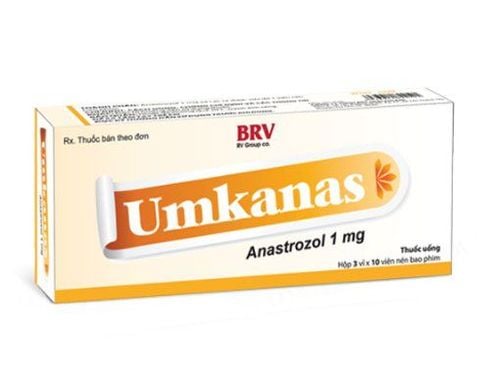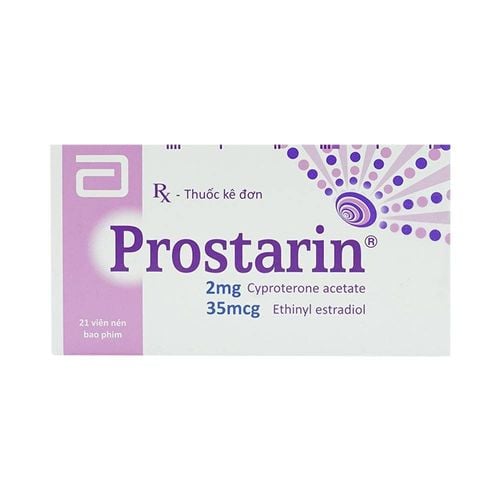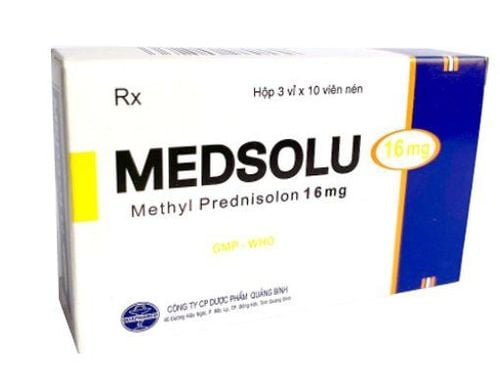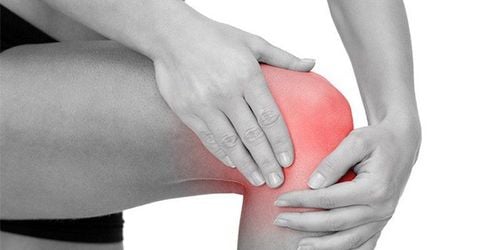This is an automatically translated article.
Belonging to the group of hormones and hormones, Valiera 1mg is prescribed for symptomatic treatment of moderate to severe vasomotor disorders in premenopausal women. To ensure the effectiveness when using Valiera 1mg, users need to follow their doctor's instructions, and refer to more content about the use of Valiera 1mg drug in the following article.
1. What are the effects of Valiera 1mg?
1.1. What is Valiera 1mg? Valiera drug belongs to the group of hormones, hormones. Valiera 1mg drug includes the following ingredients:
Main active ingredient: Estradiol 1 mg Excipients: Polividone, Sodium Starch Glycolate, Lactose Monohydrate, Talc powder, Magnesium Stearate, Microcrystalline Cellulose, FD&C Yellow N°6. Aluminous lacquer, Corn Starch just enough. Film-coated excipients: Macrogol 6000, Hypromellose 2910, Talc powder, Pink Polymeric Coating (Pink Opaspray K-1 14000). The drug is prepared in the form of film-coated tablets of 1 mg, blisters of 30 tablets, blister boxes.
Valiera 1mg is recommended for use in adults
1.2. What diseases does Valiera 1mg treat? Valiera 1mg is prescribed by doctors in the following cases:
Treatment of symptoms of moderate to severe vasomotor disorders associated with menopause. There is no comparable evidence that estrogens affect the neurologic or depressive symptoms commonly associated with menopause, so treatment is not indicated in these cases. Treatment of vulvar and vaginal atrophy. Treatment of cases of decreased estrogen secretion due to hypogonadism, oophorectomy or primary ovarian insufficiency. Treatment of androgen-dependent advanced prostate carcinoma (for temporary treatment only) Prevention of osteoporosis. Contraindications:
Patients who are allergic to the main ingredient Estradiol or any of the excipients of Valiera 1mg. Pregnancy or suspected pregnancy. Estrogen can harm an unborn baby when administered to a pregnant mother. Abnormal vaginal bleeding of unknown cause. Identify or suspect breast cancer, cervical cancer or other gynecological cancers. Known or suspected estrogen-dependent tumors. The patient has a family history of gynecological cancer. Progressive thrombophlebitis or thromboembolic disease. Severe liver, kidney or heart disease.
2. Usage of Valiera 1mg
2.1. How to take the drug Valiera 1mg Valiera medicine 1mg for oral administration Take the drug with a sufficient amount of filtered water Do not mix the drug with any other mixture. Strictly follow the doctor's instructions 2.2. Dosage of Valiera 1mg In the treatment of moderate to severe vasomotor symptoms, vulvar and vaginal atrophy in menopause should be started with the lowest therapeutic dose. In addition, choose a regimen that can control symptoms and then discontinue the drug as soon as possible.
Discontinuation or dose reduction should be done at intervals of 3 to 6 months. The usual starting dose per day is 1 - 2 Valiera mg tablets, depending on the patient's level of control of existing symptoms. The minimum effective maintenance dose should be determined by titration (increase the dose gradually until the effective dose is reached, use it as the maintenance dose). The use of the drug must be carried out in each cycle (eg: Take 3 weeks, stop 1 week). Treatment of women with decreased estrogen secretion due to hypogonadism, oophorectomy or primary ovarian insufficiency.
The usual starting dose is 1 tablet - 2 Valiera mg tablets daily, depending on the patient's level of control of existing symptoms. The minimum effective maintenance dose should be determined by titration. Treatment of androgen-dependent advanced prostate carcinoma:
The recommended dose is 1 tablet - 2 Valiera Img tablets, 3 times a day. The effectiveness of the treatment regimen can be assessed by determining the amount of phosphatase as well as the improvement of the patient's symptoms. Osteoporosis prevention:
Osteoporosis prophylaxis with Valiera 1 mg daily after menopause should be initiated as soon as possible. The daily dose is 0.5 mg estradiol, orally cyclically (i.e., 23 days, 5 days off) (Valiera lmg, 1/2 tablet per day is recommended). Dosage may be adjusted as needed to control the patient's existing symptoms. Treatment for missed dose:
Take it as soon as you remember, if it's almost time for the next dose, skip the missed dose and continue
take the medicine as usual, don't make up for the next dose.
Treatment of overdose:
Overdose treatment includes symptomatic and supportive treatment
3. Notes when taking Valiera 1mg
Caution when using Valiera 1mg drug for the following subjects:
Increased lipoprotein is related to family factors. Cardiovascular disease risk. Uterine bleeding, breast pain. The patient has impaired liver function. Subjects are at risk of causing cancer, genetic mutations and affecting fertility.
4. Valiera 1mg . side effects
Genitourinary tract: There are changes in menstrual period, abnormal bleeding between menstrual periods or abnormal bleeding rate; heavy, mottled menstruation; vaginal candidiasis ; increased size of uterine fibroids; changes in the amount of secretions of the uterus.
Breasts: feeling of fullness and swelling.
Digestion: Nausea, vomiting, flatulence, abdominal cramps; cholestatic jaundice; increased risk of gallbladder disease.
Skin: tan or age spots may persist even after stopping the medication; purpura; erythema nodosum; hair loss; hirsutism in women.
Eyes: intolerance to contact lenses , increased curvature of the cornea;
Central nervous system: Headache, migraine, dizziness; nervous inhibition; convulsions.
Other cases: Weight gain or loss; reduced carbohydrate tolerance; exacerbation of porphyria; edema; change in sexual desire.
5. Valiera 1mg . drug interactions
Warn patients when using with certain other drugs (eg, barbiturates, phenylbutazol, hydantoin, rifampin) because concurrent use may reduce the effect of Valiera.
Decrease in prothrombin time, specific thromboplastin time and platelet aggregation time; increased platelet count; increased fibrinogen concentration and fibrinogen activity; Increases in plasminogen antigen and its activity have been reported.
Increased levels of thyroid-binding globulin (TBG) lead to an increase in the total concentration of thyroid hormones circulating in the blood. Patients on thyroid hormone replacement therapy need to take higher doses.
Other serum protein-binding agents may also be elevated (eg, globulin-binding corticosteroids, globulin-binding sex hormones) resulting in increased corticosteroid and sex hormone concentrations. Free hormone levels may decrease. Other plasma proteins may be elevated (angiotensinogen/renin substrate, alpha-1-antitrypsin, ceruloplasmin).
Increases plasma HDL and HDL2 fractional cholesterol concentrations; reduce the concentration of LDL cholesterol; increased blood triglyceride levels.
Glucose intolerance.
Decreased response to the metyrapon test.
Ciclosporin can be used with estrogen, but with caution, because of the potential to increase blood levels of ciclosporin, creatinine and transaminases. This phenomenon is due to decreased hepatic elimination of ciclosporin.
Above is important information about Valiera 1mg drug, patients should carefully read the instructions and use the drug according to the indications to get the best treatment results.
Please dial HOTLINE for more information or register for an appointment HERE. Download MyVinmec app to make appointments faster and to manage your bookings easily.




